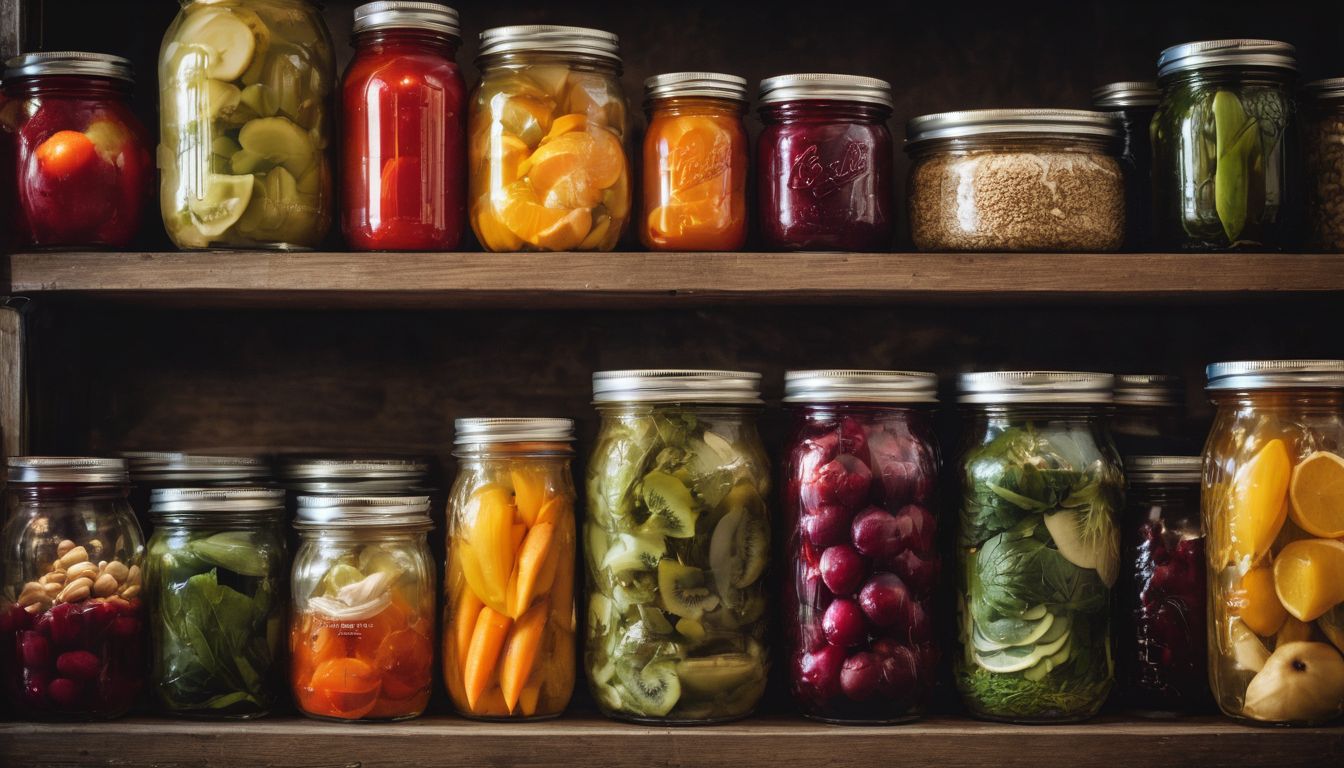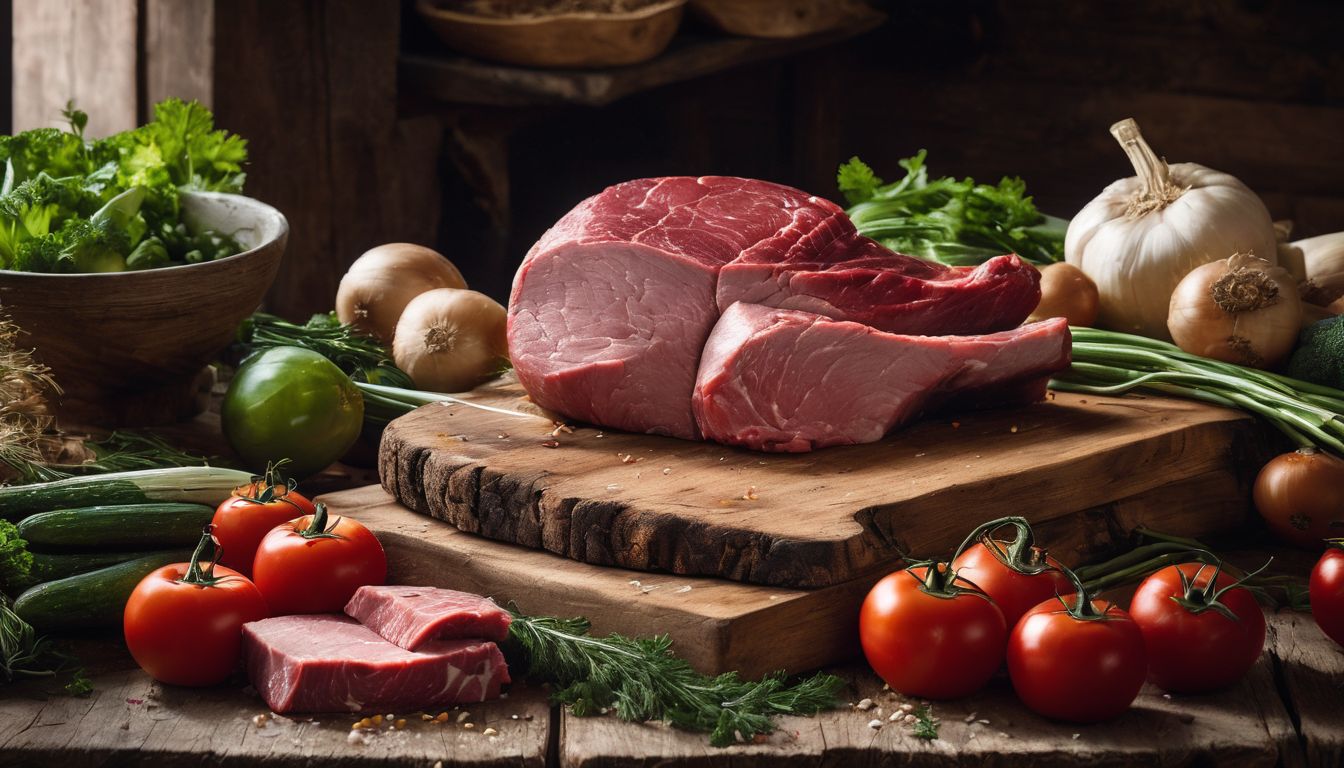Confused by the array of labels on your food? You’re not alone. In the UK, organic products must meet strict standards before they earn that coveted label. This guide will demystify these standards and show you exactly what to look for when choosing organic.
Dive in and become a savvy shopper today!
Key Takeaways
- Organic food in the UK must follow strict standards, avoiding synthetic pesticides and fertilisers, with certification from control bodies like Soil Association.
- Labels on organic products should clearly indicate ingredients, allergen information, storage instructions and any specific regulations set by EU organic regulation or Defra.
- Producers need to register and obtain official certification before their products can be marketed as organic, ensuring consumer trust in their environmental impact and ethical values.
- The use of recognised organic logos on packaging helps consumers easily identify genuine organic foods while shopping.
- Businesses must avoid making false claims about their organic products and adhere to trading standards to maintain label accuracy.
Understanding Organic Food Labeling Standards in the UK
In the UK, organic food is defined as products that are made using sustainable farming practices without synthetic pesticides or fertilisers. The certification process and control bodies ensure that these standards are met.
What is considered organic?
Organic food stems from a farming system that avoids synthetic chemicals, like pesticides and fertilisers. It champions sustainable and environmentally friendly practices. Foods earn the organic label by meeting strict standards which cover all aspects of production, from soil quality to animal welfare.
Crops must grow in safe soil, have no modifications, and remain separate from conventional products. Livestock raised for meat, eggs, and dairy need to live in natural conditions with access to the outdoors and organic feed.
These principles ensure that what lands on your plate supports not only personal health but also the health of our planet. Meeting these criteria is just the first step; everything must be verified by an accredited UK organic control body before it can be officially classified as organic.
This leads us into understanding how exactly these bodies certify products as being up to par with rigorous agricultural standards.
Certification process and control bodies in the UK
After understanding what is considered organic, it’s important to know the certification process and control bodies in the UK.
- The UK has established various control bodies responsible for certifying organic food. These include the Soil Association, Organic Farmers & Growers, and the Organic Food Federation.
- The certification process involves rigorous checks and audits to ensure compliance with organic standards. This includes on-site inspections of farms and food processing facilities.
- Control bodies assess compliance with regulations such as crop rotation, use of pesticides, and animal welfare standards. They ensure that all products bearing an organic label meet these criteria.
- Producers must apply for certification through their chosen control body, providing detailed information about their farming or production methods.
- Once certified, producers are allowed to display the official organic logo on their products, indicating approval by the control body.
Labelling Requirements for Organic Food in the UK
Clarity and accuracy in organic food labels are essential to inform consumers about the nature of the product. This includes clear ingredient listings, adherence to food compositional standards, allergen warnings, and proper storage instructions.
Clarity and accuracy
Organic food labels in the UK must provide clear and accurate information about the product’s organic status. The labelling should be easy to understand, with all details presented in a straightforward manner.
Accurate representation of the organic certification is essential to help consumers make informed choices regarding their purchases.
Labels on organic foods need to accurately reflect the true nature of the product, providing clarity around its organic credentials. This transparency empowers consumers to confidently select products that align with their environmental and ethical values.
Ingredient listing
Moving from ensuring clarity and accuracy in organic food labelling, the ingredient listing is a crucial aspect to note. It provides transparency and understanding for consumers who are environmentally conscious, supporting conservation and environmental ethics.
- All ingredients, including additives and processing aids, must be listed on the label.
- Each ingredient should be clearly identified by its common name or description and listed in descending order of weight.
- The use of non – organic agricultural ingredients in organic processed products is subject to specific conditions laid down in regulations.
- The word “organic” must appear before the name of the product if it contains 95% or more organic ingredients (excluding water and salt).
- The percentage of organic ingredients must be specified when used on the label.
Food compositional standards
Organic food compositional standards ensure that products meet specific criteria to qualify as organic. These standards cover the use of additives, processing aids, and fortifying substances in organic foods.
The composition must adhere to strict guidelines, including restrictions on synthetic chemical inputs and genetically modified organisms.
Compositional standards also demand high-quality ingredients sourced from sustainable agricultural practices. This assures consumers that their organic purchases truly align with their environmental values.
Adhering to these rigorous criteria supports ethical sourcing and promotes a healthier environment for all.
Allergens and warnings
When purchasing organic food in the UK, it’s crucial to be aware of allergens and warnings. Ensure that you consider the following:
- Allergen information should be clearly stated on the label to aid consumers with allergies or intolerances.
- Warnings about potential cross – contamination should be prominently displayed if applicable.
- It’s important to check for any specific guidance or requirements related to allergens and warnings from the control bodies and certifying authorities.
- Take into account any additional regulations for labeling allergens and warnings in organic food set by the EU organic regulation and Soil Association standards.
- Consult the Defra regulations to ensure compliance with UK guidelines on providing clear allergen information and warnings.
Storage and handling instructions
When storing organic food, always check the label for specific storage instructions. Keep organic produce in the refrigerator to maintain freshness and prevent spoilage.
- Store fresh organic fruits and vegetables in the crisper drawer of the refrigerator to help them retain their nutrients and freshness.
- Keep organic dairy products, such as milk and cheese, in a cool place away from direct sunlight to prevent them from spoiling quickly.
- Ensure that organic meats are stored in an airtight container or wrapped tightly to avoid cross-contamination and prevent bacterial growth.
- Store organic grains, pulses, and dry goods in airtight containers or packaging to protect them from moisture and pests.
- Handle organic food with clean hands and use separate utensils to avoid contamination.
Key Regulations for Organic Food Labelling in the UK
– EU organic regulation and Soil Association standards are crucial for understanding the requirements for organic food labeling in the UK. Defra regulations also play a significant role in ensuring that organic products meet the necessary standards.
EU organic regulation and Soil Association standards
The EU organic regulation sets the standards for organic food production in the UK. Soil Association stands out as one of the key bodies responsible for regulating and certifying organic products.
Their stringent guidelines ensure that organic products meet high environmental and ethical standards, promoting sustainable agriculture practices that benefit both people and the planet.
These standards cover everything from soil health to animal welfare, ensuring that consumers can trust the integrity of the organic label when making their purchasing decisions.
Defra regulations
The Department for Environment, Food & Rural Affairs (Defra) regulates organic food labeling in the UK. They ensure that all organic products meet the required standards set by the EU organic regulation and Soil Association’s guidelines.
Defra regulations cover various aspects of organic food production, including farming practices, processing, packaging, and labeling requirements. By adhering to Defra regulations, consumers can trust that the organic products they purchase are of high quality and have been produced in an environmentally sustainable manner.
Now let’s delve into important information for businesses selling organic food in the UK.
Important Information for Businesses Selling Organic Food in the UK
Businesses selling organic food in the UK must comply with registration and certification requirements set by UK control bodies. They should also be aware of the use of organic symbols and logos, as well as prohibited claims when advertising their products.
Registration and certification requirements
To sell organic food in the UK, businesses need to undergo a registration and certification process. Here are the key requirements for registering and certifying organic food products:
- Submit an application to a control body accredited by the Department for Environment, Food & Rural Affairs (Defra).
- Provide detailed information about the products, production methods, and supply chain.
- Undergo regular inspections of farms, production facilities, and records to ensure compliance with organic standards.
- Obtain a certificate from the control body confirming compliance with organic regulations.
- Display the certification logo on product packaging or promotional materials as proof of organic status.
Use of organic symbols and logos
Once certified, businesses can display approved organic symbols and logos on their packaging. These visual cues help environmentally conscious consumers quickly identify organic products on the shelves.
The use of these symbols signals compliance with UK organic food standards and builds consumer trust in the authenticity of the product.
Businesses should ensure that they adhere to the guidelines for using organic symbols and logos provided by certification bodies. This includes specific rules about size, placement, and colour usage to avoid misleading or confusing consumers.
Prohibited claims
When promoting organic food in the UK, it is important to note that there are prohibited claims that cannot be made on product labels or in advertising. Claims like “100% pesticide-free” or “guaranteed to cure ailments” are not allowed, as they can mislead consumers about the benefits of organic products.
In line with EU regulations and Soil Association standards, any unsubstantiated health claims or absolute statements should be avoided when labelling or marketing organic food products.
It’s crucial for businesses and individuals to understand and comply with these regulations to ensure transparency and consumer trust in the organic food industry. By avoiding prohibited claims and sticking to factual information, it helps maintain integrity within the market while providing accurate information to environmentally conscious consumers.
Additional Resources and Guidance for Labelling Organic Food in the UK
This section will provide businesses with additional resources, including labelling guidelines and checklists for organic food, information on Brexit labelling changes submission forms, and links to trading standards.
It aims to assist in ensuring compliance with the UK’s organic food labelling standards.
Labelling guidelines and checklist
To ensure accurate and compliant organic food labelling in the UK, consider the following guidelines and checklist:
- Clearly state “organic” on the packaging to indicate certified organic status.
- Provide a full list of ingredients, stating which ones are organic.
- Comply with compositional standards for organic foods, ensuring a minimum percentage of organic ingredients.
- Highlight allergens and provide necessary warnings for sensitive consumers.
- Include clear storage and handling instructions for maintaining product integrity.
- Adhere to EU organic regulations, Soil Association standards, and Defra regulations when designing labels.
- Obtain proper certification from relevant control bodies in the UK before labelling products as organic.
- Use authorised organic symbols and logos permitted by certification bodies.
- Avoid making false or misleading claims about product origin or environmental impact on packaging and advertising materials.
- Stay informed about changes in labelling requirements post Brexit through submission forms and guidance from agricultural authorities and trading standards.
Brexit labelling changes submission form
To facilitate the transition of organic food labelling regulations post-Brexit, businesses are required to complete the Brexit labelling changes submission form. This form ensures compliance with new regulations and allows authorities to oversee any necessary adjustments to labelling information.
By submitting this form, companies can continue to maintain their organic certification in the UK market by adhering to the latest standards without disruption.
For environmentally conscious individuals engaged in supporting conservation and environmental efforts, understanding and complying with Brexit labelling changes is essential for upholding organic food principles while meeting updated regulatory requirements.
Trading standards
UK trading standards play a crucial role in ensuring that organic food labeling complies with regulations and meets consumer expectations. They monitor the accuracy of organic labels, investigate complaints about misleading information, and enforce legal requirements to protect consumers from false claims.
Businesses selling organic products must adhere to these standards, providing clear and truthful labelling information that reflects the authenticity of their organic products.
Trading standards oversee the honesty and integrity of organic food labelling, contributing to consumer confidence in choosing genuine organic products. By upholding these regulations, they support environmentally conscious individuals’ efforts towards sustainable living practices while promoting transparency within the industry.
Conclusion
In conclusion, understanding organic food labeling in the UK is essential for consumers and businesses. Compliance with regulations ensures clarity and accuracy on labels, building trust among environmentally conscious individuals.
By following the certification process and guidelines, businesses can contribute to consumer awareness of sustainable agricultural practices. Additionally, staying updated on key regulations and incorporating organic symbols appropriately will help ethical businesses thrive in the UK market.
FAQs
1. What are organic food labeling standards in the UK?
Organic food labeling standards in the UK are rules set to make sure agricultural products marked as organic meet strict farming practices and consumer awareness guidelines.
2. Who checks if my food meets organic regulations?
UK organic control bodies inspect and certify that your food follows the UK’s organic certification standards before it can be labeled as such.
3. Can I sell imported products as organic in the UK?
Yes, you can sell imported products as organic, but they must adhere to the UK’s importing organic products regulations to ensure quality and safety for consumers.
4. Do all natural products qualify as organic?
No, not all natural products qualify; they must comply with specific agriculture standards and go through proper certification to be labeled as “organic.”
5. How should I label my product if it is certified organic?
Follow the Organic Food Labeling Guidelines closely when labeling your product, including using approved logos and statements ensuring clarity on healthy eating benefits for customers.





